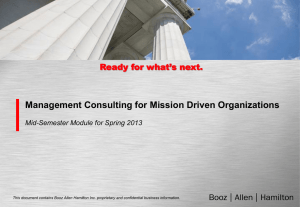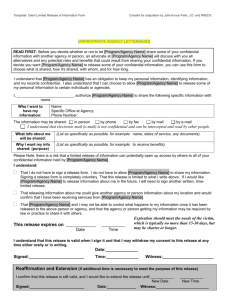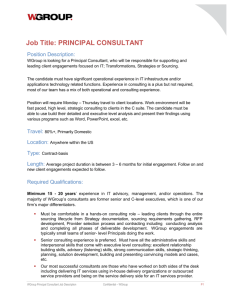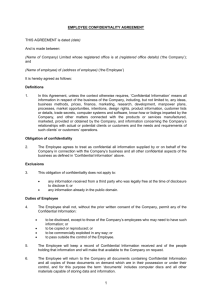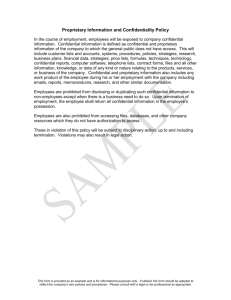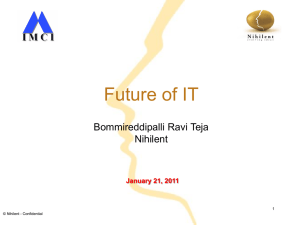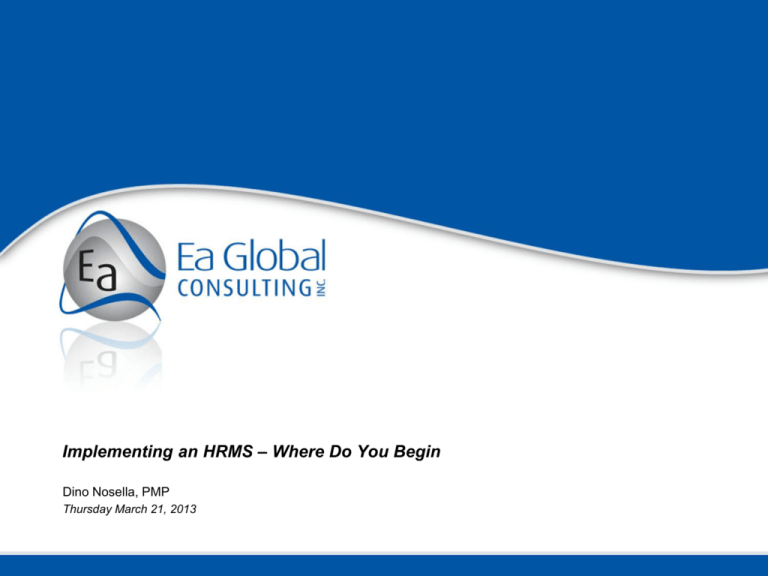
Implementing an HRMS – Where Do You Begin
Dino Nosella, PMP
Thursday March 21, 2013
Agenda
• Introduction
• Definition of HRMS/HRIS
• The life cycle of Implementing an HRMS/HRIS
• Questions
Copyright at 2013 Ea Global Consulting Inc. All rights reserved
March 21, 2013
Confidential
1
Definition of HRMS/HRIS?
A Human Resources Management System (HRMS) is a
software application(s) that combines many human
resources functions, including benefits administration,
payroll, recruiting, learning management, and performance
management.
A Human Resources Information System HRIS is a system
used by human resources departments to track employees
and information about them.
Copyright at 2013 Ea Global Consulting Inc. All rights reserved
March 21, 2013
Confidential
2
Getting Started May Feel Like Herding Cats
Copyright at 2013 Ea Global Consulting Inc. All rights reserved
March 21, 2013
Confidential
3
HRMS Project Life Cycle
Need for
HRMS
• Business Drivers
• Pain Points
Preparation
• Define goals &
objectives
• Business case
• Steering
Committee
Project
Definition
Vendor
Selection
• Detailed Business
requirements
• SaaS vs Hosted vs
On-Premise
• Integrated vs Best
of Breed
• RFI
• Research Vendors
• Selection Criteria
• RFP
• Contract
negotiations
Copyright at 2013 Ea Global Consulting Inc. All rights reserved
March 21, 2013
Implementation
• Project
Management
• Scope
• Timelines
• Resources
• Budget
PostImplementation
• Transition Plan
• Realization of
Benefits
• On-going
Performance
Confidential
4
HRMS Project Life Cycle
Need for
HRMS
• Business Drivers
• Pain Points
Preparation
• Define goals &
objectives
• Business case
• Steering
Committee
Project
Definition
Vendor
Selection
• Detailed Business
requirements
• SaaS vs Hosted vs
On-Premise
• Integrated vs Best
of Breed
• RFI
• Research Vendors
• Selection Criteria
• RFP
• Contract
negotiations
Copyright at 2013 Ea Global Consulting Inc. All rights reserved
March 21, 2013
Implementation
• Project
Management
• Scope
• Timelines
• Resources
• Budget
PostImplementation
• Transition Plan
• Realization of
Benefits
• On-going
Performance
Confidential
5
Need for
HRMS
Key Questions
WHAT?
•
•
What will the an HRMS do for the business?
What pain points will it address?
WHEN?
•
•
will the HRMS project take place?
Target go-live date?
WHY?
WHO?
•
•
•
•
Why is an HRMS needed?
Does it align with business goals?
WHERE?
•
•
in the business will it impact (departments)
Geographical landscape
Copyright at 2013 Ea Global Consulting Inc. All rights reserved
Who is the project for
who needs to help?
HOW?
•
will the project get done?
March 21, 2013
Confidential
6
HRMS Project Life Cycle
Need for
HRMS
• Business Drivers
• Pain Points
Preparation
• Define goals &
objectives
• Business case
• Steering
Committee
Project
Definition
Vendor
Selection
• Detailed Business
requirements
• SaaS vs Hosted vs
On-Premise
• Integrated vs Best
of Breed
• RFI
• Research Vendors
• Selection Criteria
• RFP
• Contract
negotiations
Copyright at 2013 Ea Global Consulting Inc. All rights reserved
March 21, 2013
Implementation
• Project
Management
• Scope
• Timelines
• Resources
• Budget
PostImplementation
• Transition Plan
• Realization of
Benefits
• On-going
Performance
Confidential
7
Preparation
Defining Business Goals & Objectives
Establishing clear Goals &
Objectives is critical!
It drives decision-making
Establishes metrics for success.
What is the difference between Goals and Objectives?
•
•
Goals are high-level and generic. May also be referred to as the “vision” and provides general
guidance.
Objectives are specific targets within the goal. They need to be SMART
(Specific, Measurable, Achievable, Realistic, and Timely)
Common Mistakes…
• Insufficient time & attention is given to establish goals and objectives
• Objectives are not SMART
• Goals & Objectives are documented in the beginning and filed away
– out of sight & out of mind
Copyright at 2013 Ea Global Consulting Inc. All rights reserved
March 21, 2013
Confidential
8
Preparation
Preparing the Business Case
The purpose to the Business Case is to get approval to implement an HRMS
Must demonstrate business value:
• Cost Reductions
• Support for Business Growth
• Improving Operations (efficiency, cycle times)
• Regulatory Compliance (government, CBAs, etc)
Requires high-level research and information:
• High-level business requirements
• Project cost estimates
• Operational (on-going) cost estimates
• Cost & Risks of maintaining status quo
Copyright at 2013 Ea Global Consulting Inc. All rights reserved
March 21, 2013
Confidential
9
Preparation
Balancing Forces in the Business Case
RISK
!
RISK
?
Project Barriers
Need for
Change
Future State
•Benefits
Current State
•Pain Points
Copyright at 2013 Ea Global Consulting Inc. All rights reserved
March 21, 2013
Confidential
10
Preparation
Establishing A Steering Committee
The Role of a Steering Committee
•
•
•
•
•
•
•
•
Provides guidance and direction on scope, funding and timing
Provides direction on communication to the organization
Removes barriers to the success of the project
Commits the required resources to the project
Facilitates organization readiness and end-user adoption
Monitors the progress and the organizational impacts of the project
Resolves escalated issues and ensures decisions are carried out
Sign-offs on key deliverables/project milestones
Steering Committee Membership
• Should be comprised of senior members of the organization (VP-level and above)
• Representatives of key areas or key stakeholders impacted by the HRMS
• Members need to commit to be active participants
Copyright at 2013 Ea Global Consulting Inc. All rights reserved
March 21, 2013
Confidential
11
Preparation
Executive Sponsorship
Sponsorship is a commitment by management to define, defend, and
support projects throughout the project life cycle.
Sponsor Activities:
•
•
•
•
•
•
Approve budget, schedule and scope
Define, communicate & champions the Project Vision throughout the organization
Ensures alignment between competing strategic projects
Sets expectations at the executive level
Resolves escalated issues and ensures decisions are carried out
Ensure necessary project and business resources are available
Copyright at 2013 Ea Global Consulting Inc. All rights reserved
March 21, 2013
Confidential
12
Preparation
1.
2.
3.
4.
5.
6.
7.
8.
9.
10.
10 Attributes of an Executive Sponsor
Understands the problem(s) the project will resolve
Ensures the solution fixes the problem(s)
Provides the right resources at the right time
Is an advocate, coach, and influencer for the project
Understands and helps resolve the big issues
Holds the team accountable for results
Knows where “good enough” is
Understands change impacts
Acts as a change agent
Makes tough decisions
Copyright at 2013 Ea Global Consulting Inc. All rights reserved
March 21, 2013
Confidential
13
HRMS Project Life Cycle
Need for
HRMS
• Business Drivers
• Pain Points
Preparation
• Define goals &
objectives
• Business case
• Steering
Committee
Project
Definition
Vendor
Selection
• Detailed Business
requirements
• SaaS vs Hosted vs
On-Premise
• Integrated vs Best
of Breed
• RFI
• Research Vendors
• Selection Criteria
• RFP
• Contract
negotiations
Copyright at 2013 Ea Global Consulting Inc. All rights reserved
March 21, 2013
Implementation
• Project
Management
• Scope
• Timelines
• Resources
• Budget
PostImplementation
• Transition Plan
• Realization of
Benefits
• On-going
Performance
Confidential
14
Definition
Gathering Business Requirements
Copyright at 2013 Ea Global Consulting Inc. All rights reserved
March 21, 2013
Confidential
15
Definition
Requirements Matter
Poor identification and documentation of requirements is often on “Top
Reasons why Projects Fail” lists
1. Inadequately trained and/or inexperienced
project managers
2. Failure to set and manage expectations
3. Poor leadership at any and all levels
4. Failure to adequately identify, document and
track requirements
5. Poor plans and planning processes
6. Poor effort estimation
7. Cultural and ethical misalignment
8. Misalignment between the project team and the
business or other organization it serves
9. Inadequate or misused methods
10. Inadequate communication, including progress
tracking and reporting
1. Poor sponsorship
2. Unclear requirements
3. Unrealistic timescales or budgets
4. Scope creep
5. Poor risk management
6. Poor processes/documentation
7. Poor estimating
8. Poor communication/stakeholder engagement
9. Poor business case
10. Inadequate/incorrectly skilled resources
source: pmstudent.com
1.
2.
3.
4.
5.
6.
source: gantthead.com
Copyright at 2013 Ea Global Consulting Inc. All rights reserved
Lack of User Involvement
Long or Unrealistic Time Scales
Poor or No Requirements
Scope Creep
No Change Control System
Poor Testing
source:vwww.coleyconsulting.co.uk
March 21, 2013
Confidential
16
Definition
Process for Gathering Requirements
Functionality
Inputs
Outputs
Business Rules
Data / Information
What do people
give you?
What do you do?
What rules apply? Why?
What do you
give people
What do you need to keep track of?
Enlist the help of a professional Business
Analyst with HRMS knowledge & experience!
Source: www.projectperfect.com.au
Copyright at 2013 Ea Global Consulting Inc. All rights reserved
March 21, 2013
Confidential
17
Definition
I know nothing about software…Now What?
Copyright at 2013 Ea Global Consulting Inc. All rights reserved
March 21, 2013
Confidential
18
Definition
Software Solutions: Integrated vs Best of Breed
Best-of-Breed Systems
• Designed specifically to address needs in specific functional areas.
• Richer functionality, may be industry-specific
• “Specialist” software
Integrated Systems
• Also referred to Enterprise Resourcing and Planning (ERP) systems
• Provides a number of applications (or modules) to support multiple
functional areas (Finance, Purchasing, HR, etc)
• More generic / broader functionality aimed at a wider audience.
• “Jack-of-all-trades” software
Copyright at 2013 Ea Global Consulting Inc. All rights reserved
March 21, 2013
Confidential
19
Definition
Deciding Between Integration and Best of Breed
This is a corporate (company-wide) decision and cannot
be made by an individual department in isolation!
Need to align to:
• Corporate technology (or IT) roadmap
• Software requirements from other areas of the organization
• Business growth projections
• Other business initiatives.
Copyright at 2013 Ea Global Consulting Inc. All rights reserved
March 21, 2013
Confidential
20
Definition
Integrated vs. Best of Breed – Things to Consider
Integrated
Best of Breed
Advantages
• One supplier to deal with
• A unified interface, consistent operation across
various functions
• Seamless data flows. Single point of entry.
• Minimal integration work.
• Specialist - you'll be buying into their specific
knowledge of this specific function
• Less IT intensive implementations and
maintenance
• Faster implementation due to smaller scope
Disadvantages
• Can be cumbersome and complex to use and
to understand
• Will need to give-up functionality in favour of
integration and data flow.
• More complex Implementation and upfront
costs
• May be too complex for smaller organizations
• Integration with other systems can be
complex, ineffective, and costly.
• Multiple points of entry for data.
• Suppliers / vendors are often small and may
not understand needs of large organizations.
Copyright at 2013 Ea Global Consulting Inc. All rights reserved
March 21, 2013
Confidential
21
Definition
Software Deployment Options
Software-as-a-Service
(SaaS)
Hosted
(Hybrid)
On-Premise
(Traditional)
Software is off-site,
Customer-specific
version of software, offsite
Software installed on-site
Subscription-base (ie
“leased”)
Generally subscriptionbased fee structure
Company “owns”
software
Less flexibility to
customize the software
Intermediate flexibility to
customize..
Ability to configure and
customize as needed
Copyright at 2013 Ea Global Consulting Inc. All rights reserved
March 21, 2013
Confidential
22
Definition
SaaS vs On-Premise
Software-as-a-Service (SaaS)
On-Premise
(Traditional)
Implementation
Shorter cycle but increased business
demands on change aspects
Longer cycle due to technical and
infrastructure components
Upfront Costs
Only costs of montly /quaterly subscription
and temporary hardware
Higher costs due to hardware & software
licenses
Total Cost of
Ownership (TCO)
Slightly lower in long-term (7-10yrs)
No asset ownership
Slightly larger in long-term (7-10 yrs)
Asset ownership
Upgrades
Controlled by vendor. On-going demands
on customer to test and keep updated
Controlled by customer. May utilize downlevel software.
Customization
Limited
Flexible
Integration
Very challenging. Limited ability to tailor
integrations and working with software
vendor directly
Integrations can be customized to system
needs. May still require working with software
vendor.
Data Security
Controlled by software vendor
Controlled by customer
Operational
Transparency
Little visibility into system health and vendor
(business) health.
Software owned and managed by customer.
No impact
Organizational
Change
Significant change impacts due to limited
ability to customize software. Business
must adopt software processes.
Less change impacts if software customized
to support current business practices.
Source: Panorama Consulting
Copyright at 2013 Ea Global Consulting Inc. All rights reserved
March 21, 2013
Confidential
23
Definition
When to Choose SaaS vs On-Premise
Software-as-a-Service (SaaS)
On-Premise
(Traditional)
Business Processes
Simple or “vanilla”.
Immature or undefined
Complex or unique
Business Model
Stable, little change
Volatile or constantly evolving
Company Skills
Small to mid-size
Mid to large, global
IT Skills
Little to none
Sophisticated
IT infrastructure
Little to none
Well-established
Integration with other
systems
Little to none
Need for integration
Control
Little need or desire
Require control
Source: Panorama Consulting
Copyright at 2013 Ea Global Consulting Inc. All rights reserved
March 21, 2013
Confidential
24
Definition
Researching Vendors
Enlist the help of a professional with
knowledge of HRMS Vendors & the Vendor
Selection Process.
Copyright at 2013 Ea Global Consulting Inc. All rights reserved
March 21, 2013
Confidential
25
Definition
Request for Information (RFI)
Used to collect information from different suppliers prior to formally
sourcing products or services.
Used where there are many potential suppliers and not enough
information is known about them.
It is a structured process that can be used to compare responses from
potential vendors.
Help reduce a long list of potential suppliers to a short list of those
organizations that are willing and able to fulfill your requirements.
RFIs are higher-level so they are often the first step and used in
combination with a Request for Proposal (RFP)
Copyright at 2013 Ea Global Consulting Inc. All rights reserved
March 21, 2013
Confidential
26
HRMS Project Life Cycle
Need for
HRMS
• Business Drivers
• Pain Points
Preparation
• Define goals &
objectives
• Business case
• Steering
Committee
Project
Definition
Vendor
Selection
• Detailed Business
requirements
• SaaS vs Hosted vs
On-Premise
• Integrated vs Best
of Breed
• RFI
• Research Vendors
• Selection Criteria
• RFP
• Contract
negotiations
Copyright at 2013 Ea Global Consulting Inc. All rights reserved
March 21, 2013
Implementation
• Project
Management
• Scope
• Timelines
• Resources
• Budget
PostImplementation
• Transition Plan
• Realization of
Benefits
• On-going
Performance
Confidential
27
Vendor
Selection
•
•
•
•
•
•
Selection Criteria Categories
Software Vendor’s Corporate Vision
Technology and System Architecture
Product Functionality
Product Cost
Service and Support
Supplier Longevity
• Driven through:
•
•
•
•
Vendor meetings
RFP responses
On-site demonstrations, and
References
Copyright at 2013 Ea Global Consulting Inc. All rights reserved
March 21, 2013
Confidential
28
Vendor
Selection
15-25
10-15
5-7
2-3
2
1
Narrowing Down The Vendors
• Research potential vendors
• Initial Review – Conduct Request for Information (RFI)
• Greater detail on solution – Conduct Request for Proposal (RFP)
• Conduct demonstration of solution
• Top Two Vendors – Conduct Reference Checks
• Select Vendor of Choice
Copyright at 2013 Ea Global Consulting Inc. All rights reserved
March 21, 2013
Confidential
29
Vendor
Selection
Request for Proposal (RFP)
Used to receive detailed proposals from different suppliers prior to
purchasing the software.
It should provide all required information to make an informed purchasing
decision, including:
• Scope
• Implementation timeline
• Design information. Specifications
• Budget
• Vendor corporate & financial information
It is a very structured process used to compare responses from potential
vendors and demonstrate impartiality in the evaluation process.
Clearly outlining your detailed requirements is critical to issuing a
successful RFP
Copyright at 2013 Ea Global Consulting Inc. All rights reserved
March 21, 2013
Confidential
30
Vendor
Selection
Software Demonstration
• Major objective of the demonstrations:
What do I want to SEE the software do?
• Well-organized scripted demonstration should include;
• Seeing your company data
• Viewing the software processes transactions that reflects your business
• Viewing the features and functions within the core product
• Evaluate other areas:
• Technical infrastructure
• Implementations
• Post Implementations requirements
Copyright at 2013 Ea Global Consulting Inc. All rights reserved
March 21, 2013
Confidential
31
Vendor
Selection
Contract Negotiations
• Software Contract
• Licenses vs Subscriptions
• Professional Services Contract
• Vendor vs System Integrator (SI)
Copyright at 2013 Ea Global Consulting Inc. All rights reserved
March 21, 2013
Confidential
32
Vendor
Selection
Professional Services Contract
• Scope/Deliverables
• Clearly what is in scope and NOT in scope
• Timeline
• Understanding of the detail timing when things are to be completed
• Resources
• What is the vendor providing and what will you need to provide
• Contract type
• Time and Materials vs Fixed Price vs Milestone Billing
Copyright at 2013 Ea Global Consulting Inc. All rights reserved
March 21, 2013
Confidential
33
Vendor
Selection
•
•
•
•
•
•
•
•
•
•
•
Vendor Selection Lessons Learned
Set realistic expectations
Get key decision makers on board
Right team members
No software package can cure all corporate problems
Realistic return on investment (ROI)
Understand the business requirements – functional needs and
processes
Force vendors to show the system
Keep emotions out of the selection process
Do reference checks
Understand how the software solution is maintained and enhanced
Understand the significance of change management
Copyright at 2013 Ea Global Consulting Inc. All rights reserved
March 21, 2013
Confidential
34
HRMS Project Life Cycle
Need for
HRMS
• Business Drivers
• Pain Points
Preparation
• Define goals &
objectives
• Business case
• Steering
Committee
Project
Definition
Vendor
Selection
• Detailed Business
requirements
• SaaS vs Hosted vs
On-Premise
• Integrated vs Best
of Breed
• RFI
• Research Vendors
• Selection Criteria
• RFP
• Contract
negotiations
Copyright at 2013 Ea Global Consulting Inc. All rights reserved
March 21, 2013
Implementation
• Project
Management
• Scope
• Timelines
• Resources
• Budget
PostImplementation
• Transition Plan
• Realization of
Benefits
• On-going
Performance
Confidential
35
Implementation
Project Manager – Who is the it going to be?
The P in PM is as much about PEOPLE management
as it is about PROJECT management
Persuasion and Influence
Copyright at 2013 Ea Global Consulting Inc. All rights reserved
Telling the truth
March 21, 2013
Confidential
36
Implementation
•
•
•
•
•
•
•
Project Manager – Internal vs External
Is business knowledge critical to the success of the project
Does the required skill-set exist
Seen as an expert – will they have authority
Seen as a strong leader
Do they have persuasion and influence
Ability to say “NO”
Will be able to deliver difficult news – will the truth be told
Copyright at 2013 Ea Global Consulting Inc. All rights reserved
March 21, 2013
Confidential
37
Implementation
Use of Consultants
Cons
• Will leave after project is
completed
• Costly
• Business knowledge is
limited
Copyright at 2013 Ea Global Consulting Inc. All rights reserved
Pros
•
•
•
•
Addresses skill-set gap
Not Political
Will be able to say NO
Various experiences
among projects,
industries, and products
March 21, 2013
Confidential
38
Implementation
Project Governance – The Pillars
People
•Committee Membership
•Organizational Roles
Structure
•Steering Committee
•Stakeholder Groups
•Program Board
•Project Team Organization
Copyright at 2013 Ea Global Consulting Inc. All rights reserved
Information
•Project Reports
•Issues
•Risks
•Key Documents
March 21, 2013
Confidential
39
Implementation
Key Elements of Project Governance Framework
• Establish the proper flow of information
• Define procedures to review issues and risks
• Establish mechanism to ensure required approvals are obtained
• Re-enforce decisions to achieve the desired benefits
• Define procedures to control scope, budget, and quality
• Define an escalation process that will facilitate items to be resolved.
Copyright at 2013 Ea Global Consulting Inc. All rights reserved
March 21, 2013
Confidential
40
Implementation
Project Scope Elements
• Software Application
• Benefits, Performance Management, Absent Management, Payroll, etc
• Functionality
• Organization structures, position management, compensation packages,
etc
• RICE – Reports, Interfaces, Conversions, Enhancements
• Business Processes
• Hire, Terminate, Transfer, Demote, etc
• Organizational
• Departments in the organization that will be affected
• Geographical
• Location where the system will be used
Copyright at 2013 Ea Global Consulting Inc. All rights reserved
March 21, 2013
Confidential
41
Implementation
Project Timeline, Framework and Deliverables
DATA
CHANGE
MANAGE
MENT
Architect (Design)
Configure &
Prototype
Test / Deploy
Scope Management
Project Plan
Requirements
TESTING
SYSTEM
BUILD
PROJECT
MANAGE
MENT
Project Planning
Requirements
Scope Statement
Risk Management
Detailed
Requirements
Configure
Design Document
Custom Coding
Quality Management
Transition Plan
Rework
Testing Scenarios
Test Cases
Test Cases
Master Test List
Test
Test
Upload
Workbook
Data Loads
Go Live &
Support
Lessons Learned
Support Fixes
Test any Fixes
Final Data Load
Cleansing
Stakeholders
Training Plan
Copyright at 2013 Ea Global Consulting Inc. All rights reserved
Training Materials
Training
Support
Communication and Business Readiness
March 21, 2013
Confidential
42
Implementation
Testing
TESTING, TESTING, TESTING……
………………………….and then some more TESTING
•
•
•
•
•
•
•
Testing takes time when done correctly
Allow time to address issues
Resource intensive so need to plan it
Need to find issues
Follow a process and stick to it
Vendor must test against the requirements
Various levels of testing
• Unit, String testing, User acceptance testing, Interface testing, Integration
testing
Copyright at 2013 Ea Global Consulting Inc. All rights reserved
March 21, 2013
Confidential
43
Implementation
Data Migration and Conversion
Data Cleansing
• Multiple Data
Sources
• Organizational
Impacts
• Data Readiness
Data Conversion
•
•
•
•
Data Formats
Look & Feel
Fonts
Structures /
Groupings
Data Management
• Master Data
Procedures
• Data Owners
• Lead Times
• Forms
• Overly-optimistic perceptions of data readiness
• Under-estimation of cleansing efforts
• Education of system data requirements
Copyright at 2013 Ea Global Consulting Inc. All rights reserved
March 21, 2013
Confidential
44
Implementation
The Change Management Iceberg
CHANGE
COMPONENT
PEOPLE
TECHNOLOGY
USERS
Acceptance / Skills
ROLES
Jobs / Organization
DATA
Information
SYSTEM FUNCTIONALITY
PROCESS
Tasks / Activities
PROCESS STEPS
Hand-Offs
BUSINESS PROCESSES
Organizational
Structure
Company Culture
45
Copyright at 2013 Ea Global Consulting Inc. All rights reserved
March 21, 2013
Confidential
Implementation
A Communications Strategy
WHY IT’S
IMPORTANT
WHAT IT IS
OBJECTIVES
APPROACH
• The purpose
• Expected outcomes
• Outline of process
• Associated activities
GUIDING PRINCIPLES
• Overarching philosophy
• Guide how objectives are
achieved
• The ‘Rules of the Game’
WHO IS
INVOLVED
ROLES &
RESPONSIBILITIES
KEY MESSAGES
• Consistent messages
• What stakeholders (audiences) need to know
COMMUNICATION CHANNELS
• Vehicles for delivering communications
MEASUREMENT
CRITICAL SUCCESS
FACTORS
• Effectiveness against intended communication
objectives
• Show stoppers
• Decision points
FEEDBACK PROCESS & MECHANISMS
• Accountabilities and work
effort associated with
communication planning
& development
STAKEHOLDERS
• Groups and individuals
that are impacted by and
have influence over
initiatives
• Steps to Initiate questions and make suggestions
• Methods for soliciting and receiving feedback
MAKING IT HAPPEN
THE COMMUNICATION PLAN
Copyright at 2013 Ea Global Consulting Inc. All rights reserved
March 21, 2013
Confidential
Implementation
Training
• Start planning as early as possible
• Often left to the end with little time to create the right materials
• Create materials that are useful outside the training session
• Reference guides, business processes, Quick reference sheets
• Have training as close to the Go Live as possible
• Greater impact if training is conducted by peers
• Plan for training logistics
• Schedule people into classes as early as possible
• Allow for flexibility in schedule
• Use technology when it makes sense
Copyright at 2013 Ea Global Consulting Inc. All rights reserved
March 21, 2013
Confidential
47
Implementation
Tool for Assessing Business Readiness
Low Level of Readiness
Processes
Technology
People
High Level of Readiness
•High
level flows and discussion
•Discussions focused on different
scenarios and how to handle them
•Detailed
•Uncomfortable
with system
•Struggle with system “lingo” and unable
to link to existing systems and procedures
•Comfortable
•Unsure
•High
of roles and responsibilities.
•Territorial behavior
•Mixing roles in the system with job
descriptions
process discussions
•New scenarios can be addressed quickly
with the system, can describe
screens, visualize
•Can easily link system terminology to
existing terminology
comfort with roles and responsibilities.
•Can see the big picture. Understand
difference between system roles and
business roles
48
Copyright at 2013 Ea Global Consulting Inc. All rights reserved
March 21, 2013
Confidential
HRMS Project Life Cycle
Need for
HRMS
• Business Drivers
• Pain Points
Preparation
• Define goals &
objectives
• Business case
• Steering
Committee
Project
Definition
Vendor
Selection
• Detailed Business
requirements
• SaaS vs Hosted vs
On-Premise
• Integrated vs Best
of Breed
• RFI
• Research Vendors
• Selection Criteria
• RFP
• Contract
negotiations
Copyright at 2013 Ea Global Consulting Inc. All rights reserved
March 21, 2013
Implementation
• Project
Management
• Scope
• Timelines
• Resources
• Budget
PostImplementation
• Transition Plan
• Realization of
Benefits
• On-going
Performance
Confidential
49
Post
Implementation
Transition Plan
Describes the process to deliver the system from the project team to
the support group that will maintain the system
•
Transition process: Outlines approval requirements and a schedule of
transition activities
•
Documentation requirements: Documents to be prepared including contracts,
training materials, and any other forms or legal documents.
•
Roles and responsibilities: Describes the roles and responsibilities of the
project team and the receiving organization in the transition process.
•
Transition critical success factors: Describes the critical success factors that
are considered essential to ongoing benefits sustainment and assurance.
Copyright at 2013 Ea Global Consulting Inc. All rights reserved
March 21, 2013
Confidential
50
Summary points
•
•
•
•
•
•
•
•
•
•
•
•
Clear business objectives and goals
Strong ownership
Requirements matter
See the solution in action
Clear expectations of scope
Strong Project Management Leadership
Governance
TEST, TEST, TEST, TEST
Data efforts not to be under-estimated
Consider Change Management impacts
Clear communications
Understand the end
Copyright at 2013 Ea Global Consulting Inc. All rights reserved
March 21, 2013
Confidential
51
Dino Nosella
Dino.Nosella@eagc.ca
647.268.8145
52
Copyright at 2013 Ea Global Consulting Inc. All rights reserved
March 21, 2013
Confidential


